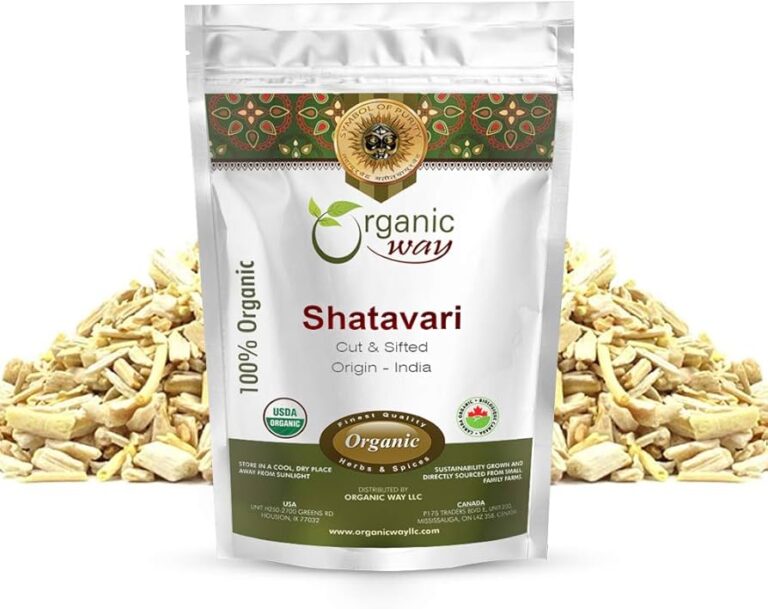
Shatavari (Asparagus racemosus), an important Ayurvedic herb, has been revered for its numerous health benefits, especially in supporting reproductive health. It is an adaptogen, helping the body adapt to stress, and is widely used in Ayurvedic medicine for its ability to balance the doshas, particularly Vata and Pitta.
Local Names and Meaning
In India, Shatavari is also known as Shatuli and Vrishya. The name “Shatavari” translates to “the plant with a hundred roots,” but it’s often interpreted as “she who has a hundred husbands” due to its potency in supporting the female reproductive system.
Taste and Effects on Doshas
Shatavari has a bitter and sweet taste, offering cooling, nourishing, and soothing effects. It primarily balances Vata and Pitta doshas, but excessive consumption may aggravate Kapha.
Medicinal Uses of Shatavari
-
Antioxidant Properties: Shatavari is rich in saponins, which have antioxidant effects, protecting cells from damage caused by free radicals.
-
Boosts Immunity: It stimulates the production of immune cells, enhancing the body’s defense system.
-
Improves Digestive Health: It promotes digestion by boosting the activity of digestive enzymes like lipase and amylase, aiding in fat and carbohydrate digestion.
-
Relieves Cough: Studies show Shatavari root juice acts as an effective natural remedy for cough, comparable to prescription medications.
-
Regulates Blood Sugar: Shatavari helps maintain blood sugar levels, making it beneficial for people with Type 2 diabetes.
-
Aphrodisiac for Women: Shatavari enhances female libido and is known for supporting sexual health, balancing hormones and reproductive function.
Shatavari for Female Reproductive Health
Shatavari is often called a woman’s best friend, offering a range of benefits from menarche to menopause:
- Regulates the menstrual cycle and reduces heavy menstrual bleeding (menorrhagia).
- Increases vaginal lubrication and promotes blood flow to the vaginal area.
- Reduces symptoms of PMS and menstrual cramps (dysmenorrhea).
- Boosts female libido and helps in conception.
- Supports lactating mothers by enhancing milk production.
- Alleviates menopause symptoms, such as irritability, hot flashes, and night sweats.
Shatavari for Skin Health
-
Anti-Wrinkle: Shatavari helps prevent and manage facial wrinkles by harmonizing Vata dosha, promoting rejuvenated and healthy skin.
- Usage: Mix Shatavari powder with honey or milk, apply it to affected areas, and leave it for 3-4 hours. Repeat 2-3 times a week.
-
Wound Healing: It aids in wound healing and reduces inflammation.
- Usage: Make a paste of Shatavari powder and coconut oil and apply it to the wound for faster healing.
Shatavari for Weight Loss
Shatavari can regulate metabolism and encourage detoxification, which may support weight loss. Take it in the morning with warm water or milk.
Potential Side Effects and Risks
While Shatavari is generally safe for most, there are precautions:
- Allergic Reactions: Those allergic to asparagus should avoid it. Symptoms may include skin rashes, trouble breathing, and dizziness.
- Diuretic Effects: Shatavari may increase urination. Avoid using it with other diuretic herbs or medications.
- Blood Sugar: Shatavari may lower blood sugar levels. Caution is needed if taking it alongside other blood sugar-lowering drugs.
Dosage Recommendations
For adults, the following doses are recommended:
- Shatavari Syrup: 1-2 teaspoons twice a day
- Shatavari Churna: ¼-½ teaspoon twice a day
- Shatavari Juice: 2-3 teaspoons once a day
- Shatavari Tablet: 1-2 tablets twice a day
- Shatavari Capsule: 1-2 capsules twice a day
Always consult a healthcare professional before beginning any new supplement.



